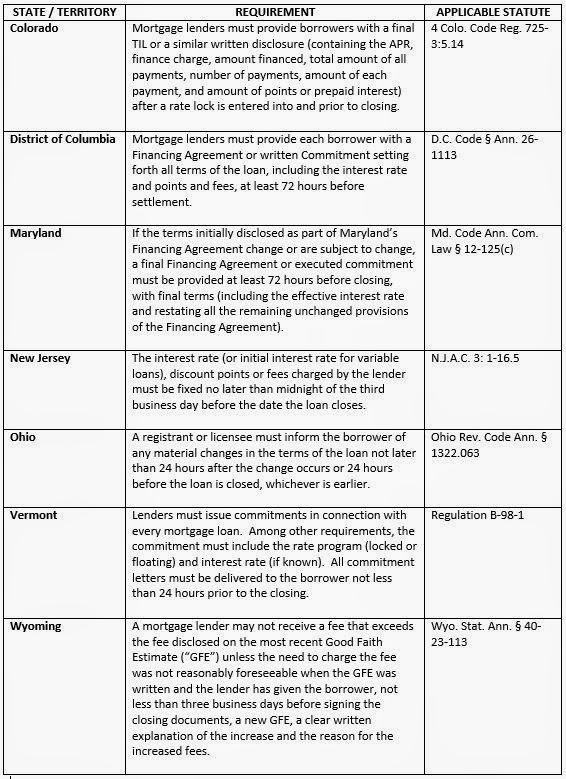QUESTION
Once
a consumer locks his or her interest rate, are there any waiting period
requirements prior to closing?
ANSWER
In
certain instances, a lender will not be able to close a mortgage loan
immediately following a consumer locking the rate. Waiting period requirements exist in some
instances depending on the circumstances as well as the state in which the
subject property is located.
There
are many considerations to take into account when determining whether a waiting
period exists between rate lock and closing.
First,
a mortgage lender must consider whether the seven business day waiting period
from initial disclosures expired. A creditor must deliver or mail initial
disclosures no later than three business days after receiving the consumer’s
application and at least seven business days before consummation.
If
this requirement has been met, a mortgage lender must next consider whether the
rate lock resulted in any changes in terms requiring re-disclosure of the Truth-in-Lending
Statement (“TIL”) due to inaccuracy of the annual percentage rate (“APR”). The
APR is inaccurate if the APR varies by more than one-eighth of one percent
(.125) in a regular transaction or more than one quarter of one percent (.25)
in an irregular transaction; and, if either inaccuracy occurs, a revised TIL
must be re-disclosed. Irregular transactions include transactions with multiple
advances, irregular payment periods, or amounts other than an irregular first
or last period or payment. If the APR is inaccurate and re-disclosure is
required, the mortgage loan transaction cannot close until three business days
after the consumer receives the revised TIL.
In
addition to the above waiting periods, various states impose additional waiting
periods between rate lock and closing. Currently, the following states require
a waiting period between rate lock and closing in certain instances:
There
are several factors to take into account once a consumer locks his or her
interest rate and prior to closing the loan. Lenders must be cautious when
determining if a waiting period exists. Waiving a waiting period for a bona fide emergency or other reason
should likely only occur in rare instances and must be properly evaluated and
documented.
Michael
Barone
Director/Legal
& Regulatory Compliance
Lenders Compliance Group

